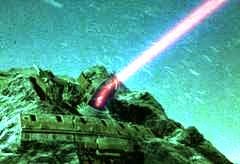Sci-fi television's weapon of choice, the laser -- light amplification by stimulated emission of radiation -- has been depicted many times and on many programs. The laser's brother -- the phaser -- has similarly been a staple of the Star Trek franchise since 1966.
Older science fiction films and programs of the 1950s also featured the antecedent of the laser, the so-called "ray gun," an early particle beam weapon.
In its early days, Star Trek (1966 - 1969) introduced the idea of Phaser I and Phaser II. The first edition phaser was a small hand-held device, which resembled an electric razor of the sixties. The weapon could then "snap" into the second, larger edition, which came with a pistol-style grip.
In "Devil in the Dark," the Phaser I was deemed insufficient to fight the Horta in the mines of Janus, and Phaser II model was required.
By the 1980s and the age of The Next Generation (1987 - 1994), the phaser pistol grip was gone, and the more defensive-appearing weapon of the Enterprise-D crew resembled, more than anything, a 1980s dust-buster.
Uniquely, the early days of the follow-up series suggested that there was no longer even a need to "aim" the phaser weapon at a target. Starfleet officers of the 24th century could fire a steady coherent beam, and then, essentially, drag it to the target. This type of phaser fire was featured dramatically in the first season episode "Arsenal of Freedom." This brand of phaser (and amplified beam...) meant, essentially, one would never miss a target, at least not for long.
Later Star Trek series, set both before and after the original series -- Deep Space Nine, Voyager and Enterprise -- featured more recognizably contemporary-seeming weapons, including bulky phaser rifles and "phase pistols."
The 1970s series Space:1999 (1975 - 1977) featured a staple-gun like "stun gun" laser that could be adjusted, via large dorsal switch, from stun to kill settings. The stun beam was generally yellow in appearance, the kill beam, blue.
The beam that the Alphan stun gun fired seemed to electrocute its target, at least based on its visualization. In one episode, "Full Circle," Professor Victor Bergman (Barry Morse) referred to the stun gun as a "ray gun," which was oddly appropriate and human, given that he would have been raised in an era in which such terminology was standard.
After Star Wars (1977), science fiction programs such as Battlestar Galactica (1978 - 1979) and Buck Rogers in the 25th Century (1979 - 1981) featured both hand-held laser weapons and ship-mounted ones.
One widely-remembered episode of Battlestar Galactica, "Gun on Ice Planet Zero," featured a mountain-based laser weapon that could destroy passing space ships with a single shot.
In the 1980s, the Visitors of V: The Series (1984 - 1985) came to Earth with laser-equipped sky-fighters and hand-held laser weapons. These weapons all fired "blue" bolts of energy that could scorch flesh.
At around the same time, the first episode of Otherworld (1985), featured a an energy weapon in which the handle was above the barrel, making the gun appear "upside-down" by our standards.
Programming of more recent vintage, like the re-made Battlestar Galactica (2003 - 2008) eschewed the lasers of its predecessor series, and utilized conventional hand and ship-mounted weapons instead.












John excellent subject sci-fi weapons lasers and phasers. Loved the faces that were brilliantly answered too.
ReplyDeleteSGB